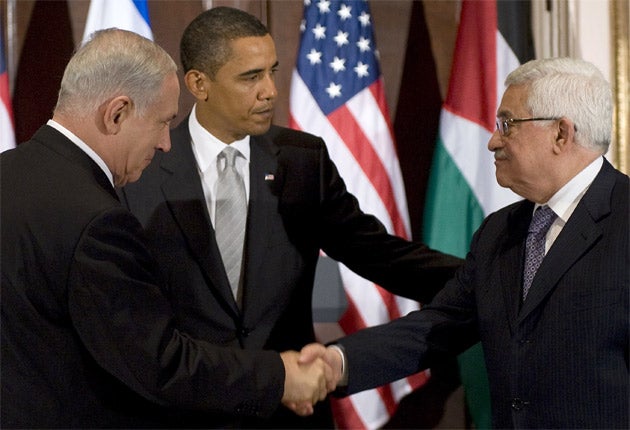We will back a global deal to cut emissions, says Obama
President signals intention to abandon intransigence of his predecessor – but admits it will be tough to get treaty through the Senate

Barack Obama insisted at a climate change summit yesterday that the US was committed to a new global treaty on greenhouse gases – explicitly distancing himself from George Bush – even while acknowledging that he faced an uphill task getting the necessary legislation passed in Washington. Listing actions taken in the US to curb carbon output since he took office, the President called his pledge "an historic recognition on behalf of the American people and their government. We understand the gravity of the climate threat. We are determined to act. And we will meet our responsibility to future generations".
Even with bursts of encouraging rhetoric from leaders at the UN gathering in New York and some new commitments to act, notably from China, the mood among delegations was sombre. There was no hiding the acute awareness that talks towards sealing a new global pact on cutting emissions at another summit in Copenhagen this December are in deep trouble.
The Chinese President, Hu Jintao, addressed criticism, partly from the US, that the largest developing countries were not doing enough to contribute to the pact. For the first time, he pledged "mandatory national targets for reducing energy intensity and the discharge of major pollutants". He was referring to new targets that will reduce carbon output per unit of production in China.
While Mr Hu offered fewer numerical specifics than some would have liked, his promise to "integrate actions on climate change in its economic and social development plan" is a major shift by the Chinese leadership. The speech was meant partly to serve notice at home that combating climate change will now be one of China's priorities along with economic growth.
The Chinese offer goes to the heart of the struggle that is playing out between developed and developing nations. The latter argue they are being asked to sacrifice their ambitions for economic stability. In the US, conservatives argue they will not commit to emissions cuts unless developing countries such as China and India shoulder their part of the bargain.
A rift has opened among developed nations, with the EU increasingly frustrated that the US, so preoccupied by healthcare reform, has yet to adopt legislation enshrining the emission cuts it will need to have in place to make a new treaty work.
Mr Obama did not attempt to hide the difficulties ahead of Copenhagen. His proposals for a cap-and-trade system to effect cuts in the US have been adopted by the House of Representatives but face long delays in the Senate, possibly even until after the mid-term elections in November next year.
Without Senate action, it will be hard for Mr Obama to sign any treaty in December. "It is work that will not be easy. As we head towards Copenhagen, there should be no illusions that the hardest part of our journey is in front of us," Mr Obama said. "All of us will face doubts and difficulties in our own capitals as we try to reach a lasting solution to the climate challenge."
Mr Obama called on developing nations to accept sacrifice. "Rapidly growing developing nations that will produce nearly all the growth in global carbon emissions in the decades ahead must do their part... they need to commit to strong measures at home and agree to stand behind those commitments just as the developed nations must stand behind their own."
Arriving in New York yesterday, Gordon Brown chaired a meeting on the issue of how much industrialised nations should pay developing countries to combat climate change. He has already proposed a $100bn-a-year (£61bn) payment by 2020.
Mr Brown urged fellow world leaders to attend the talks in Copenhagen in December on a new global deal. He fears that the issue is so complicated that the traditional negotiating tactic, of nations not declaring their hand until they get to Denmark, would end in failure.
British officials travelling with the Prime Minister do not believe there will be a formal agreement on climate change at this week's UN and G20 meetings, but hope they will provide momentum towards one. One said: "This is not the point at which a deal is done, but the point at which leaders look each other in the eye and say we must do a deal in Copenhagen."
British Government sources said the issue was "too important to be left to officials" and that leaders should start negotiations now to avoid running out of time in Copenhagen. "It's too complex to leave to a couple of days in Copenhagen. We have to see countries converging before then," one said.
Join our commenting forum
Join thought-provoking conversations, follow other Independent readers and see their replies
Comments
Bookmark popover
Removed from bookmarks